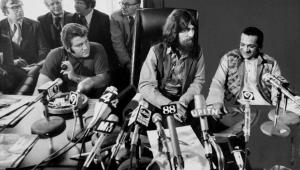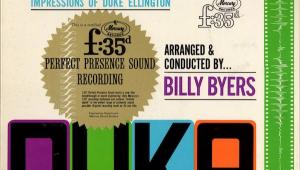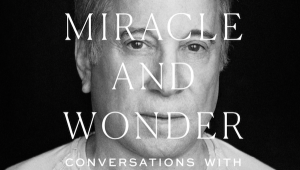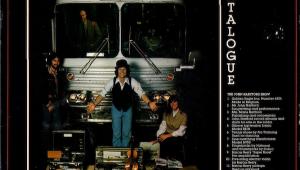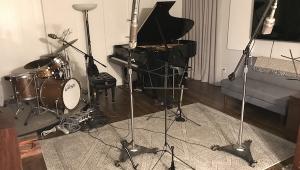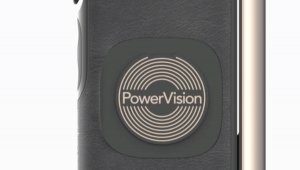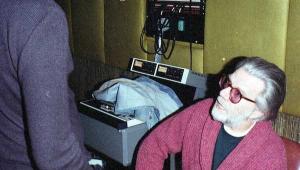VERY cool! But, as is the case for you, most of our outlets are dual-duplex, making it a no-go. Too bad you lose access to the top socket on single duplex outlets as well.
Block Audio's C-Lock Solves Wall Jack Woes
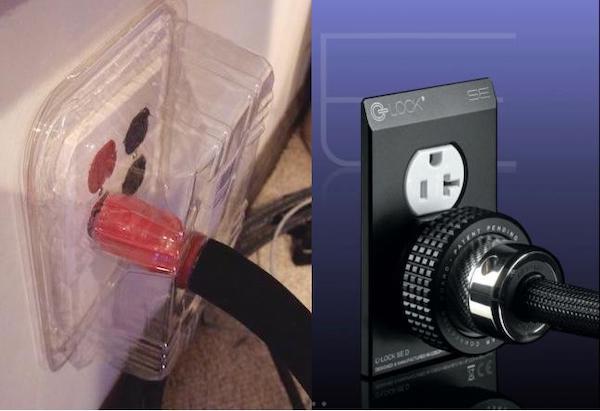
At one point this became such a problem for me that I set about inventing a solution (on the left) using a plastic Campari tomato container. Hardly elegant, but it worked! Czech Republic-based Block Audio recently introduced a far more elegant and effective solution called the C-Lock, available in numerous configurations. The press release has in red “Now why didn’t I think of this?” but of course I did! Just not nearly as well thought out or designed.
The basic concept is a wall plate incorporating a threaded protuberance over which screws what looks like a camera lens. You unscrew it, put the A.C. plug through it and into the socket and then screw in the “lens”, which holds the plug parallel to the floor and securely in place. It definitely solves a problem facing many people reading this. I’m sure of it.
The basic C-Lock (along with all of the variants), available on the Block Audio Website costs $49. You supply your own power socket. Going through the options can bring you to $395 for C-Lock SE2 D (Duplex) which includes a Furutech GTX-D NCF (R) Power Socket.
As you’ll see there are many, many variations, some of which may not be compatible with your existing sockets but no doubt you can find some that are—unless you have dual-duplex type wall sockets, which is what I have, so I couldn’t actually use the supplied SE D which features a standard 20 Amp power socket and a milled aluminum faceplate. As you can see, the ring partially blocks the upper socket. For use with multi-socket power conditioners, the C-Lock SE single socket for $125 or the $349 one with Furutech GTX-S NCF (R) makes the most sense.
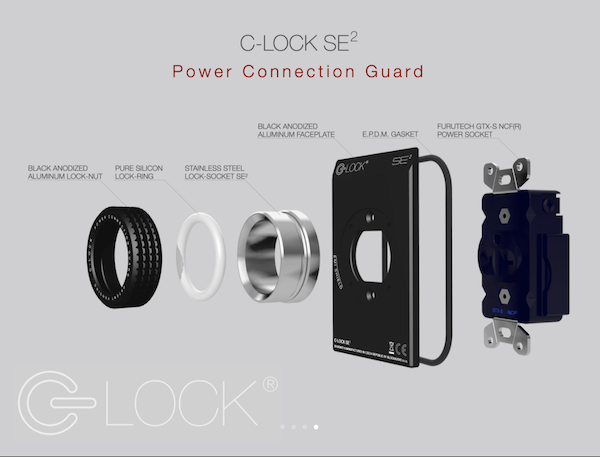
….. Though of course as “everyone knows”, socket quality cannot possibly make a sonic difference. I just wish Block Audio made dual-duplex versions because I think that’s what many of you have on your wall.
- Log in or register to post comments

As those Shunyatas look like they weigh more than the WALL they're attached to... lol. Saw these a few months ago and leave it to the man Michael to write about it!
Shunyata's cradle is a great fix on the conditioner end, and I wonder if they will put out a wall plate with their cradles attached.. that might be another fix as well?
I love the deli container! Stays up on it's own due to the equal box-wall dimensions... brilliant! Who came up with that and what was in there before? I guess German Potato Salad!

If you worry about removable headshells not being optimal for LP playback, why would you settle for a power chain that goes: plug receptacle in amp....AC cord...to wall plug?
Eliminate those pesky connections! Put on your big kid underwear and directly connect!
Solder or weld the AC cord directly to the piece of gear you are powering and to the 'wall plug.'
If you really wanna do it right, weld or solder the house electrical wires right to the socket, as well.
We think we are being complete when we are actually being half assed!
Think about how we opine the disconnects of headshells yet settle for the same flaw in our AC 'connections.'

Hi there,
try to replace your system's main power ac sockets to a European standard and the plugs. they have a round cross section that enables it to be more tightly gripped by the socket.
I have never understood why even in my country (Israel) many audiophiles change their system's plugs and sockets to american standard (we use a standard similar to the European)
Did i miss something?
Cheers

Frankly it does not help your credibility. Have you ever looked at the actual scientific research on human bias effects and how they affect our perceptions? If you have looked into it what glaring flaws have you found in the abstracts, protocols, tests or analysis?

Please measure your human or inhuman bias effects...

if you believe your experience allows you to work around your biases then you are clearly not familiar with the actual science on bias effects on aural human perception. It is physically impossible to work around bias effects. If you don't believe so I can show you a terrific video by James Johnston where he clearly outines the entire human aural perception mechanism and how bias effects infuse themselves in those percepions that can not possibly be circumvented by any amount of personal experience. The science on that is substantial and quite conclusive. So yeah, that is every bit as anti science a belief as a young earth or that climate change is a myth. You are going to have to actually look at that science first before you challenge it. Let me know if you want to watch that video. By the way you have not seen any tests proving Strads and student violins sound identical. No such tests exist. And the tests that have been done with Strads and other violins neither used "student violins" nor drew any conclusions that they all sounded the same. Not even close. And of course the issue of the sound of any musical instrument is far more complicated since it involves a human musician. Yes science is based on observation. It is also based on controlling variables. That is why anecdotal evidence is garbage. If you can't hear what you think you hear with bias controls in place which eliminate that variable then you have no scientifically valid observation. You have anecdotes. As has been so often pointed out, the only counter to science is better science. Anecdotal evidence is the opposite of that. So if you can design a better bias controlled listening test that will demonstrate what you believe to be true then that and only that will support your position on the subject of power cables. If you can show us a body of research that completely counters the existing body of research that tells us bias effects are a basic part of the human aural perception process that can not possibly be countered by personal experience please cite it. That you have convinced yourself of this based on personal experience doesn't cut it.

It's like biting a strawberry, when your ear is finely trained, you can instantly taste the subtle differences in sweetness, texture, sourness, juiciness, etc as you go from berry to berry. You have been eating for x years, critically listening and comparing for how many?

and let's keep it real. Odds are you haven't actually gone through any critical listening training which is a real thing. It's just not done at home on your own. No amount of training much less experience will change the physiological mechanisms of human aural perception. Just like no amount of training will allow a runner run faster than a cheetah. Not even the best in the world.

The human ear is an incredible sensitive organ, immensely so. It is just not super sensitive to the items measured by audio magazines Frequency and amplitude. Their amazing ability is in phase response including the ability to discern exact locations of noises from outside of the room you are in.
I also noticed you didn't make any points against my argument. You think a 5 year old can describe a strawberry like I did above?? No they would just say its "good", they grow and learn to develop their sense of taste and how to describe their experience, just as you probably did. Super powers, have you even compared power cables or are you just talking out your ass??

The fact is we actually know exactly just how sensitive and insensitive the human ear actually is. You know how we know? A massive body of scientific research. That'show we know. You know what else we know? We know the limitations of how much aural information our brains can process.You know how we know that? Through amassive body of scientific research. you know what else we know? We know that a major portion of that already reduced amount of aural information is lost to short term aural memory in less than 2 seconds. You know how we know that? Are you seeing a pattern? It goes on from there. Human hearing, aural prception and aural memory are thoroughly studied phenomenon.And yet many audiophiles who know nothing about that field of scientific study and the massive body of research seem to think they can dismiss it because.....it just seems wrong. And by the way all sound is broken down into three components. amplitude, frequency and time. Oh and another thing. You likely aren't nearly as good at detecting locations by sound alone as you think you are. And keep in mind you are easily fooled when it comes to that. I did the only point against your argument needed. that no amount of training or experience will give you super human powers. No matter how exeperienced you are or well trained you are your hearing and aural perception and aural memory are still subject to the same ceilings as all other humans.


The whole talk is terrific but the specifics that address this issue start at about 13:50. https://www.youtube.com/watch?v=X_LN7qUiTpo

One guy talking is not a fucking reference, seriously?? I mean a scientific paper that states I cant learn my system with a given record inside out and reliably discern and appreciate differences in two different power chords. I know I can, my windows rattle with some cables and with others they don't at any volume. Just like learning to taste and to put a gun together blindfolded, you can teach yourself to memorize the layout and location of instruments/effects in recordings and how they are imaged in your system. Over time any variation from the norm and it becomes obvious, bass guitar weaker, flute no longer spread right etc etc. Its the same shit man, teaching your brain to learn your system, then you can appreciate what each new piece brings.

wrote a lot of those papers. Are you genuinely interested or are you just trying to prove your beliefs are right? If you are genuinely interested you can contact JJ and he will cite the papers and you can order them from the AES and the other peer reviewed publications they were published in. He is covering a large body of research there. It's at least several hours of reading. are you really interested?

Manual dexterity and proprioception. Practice taking your gun apart over and over, when you get great turn out the lights or do it with your eyes closed, practice until you can do it almost as fast as with your eyes open. Again, the brain is an incredible learning machine.

You are conflating two very different brain functions. There are things that require enormous unconcious calculations at high speeds for us to do. And our brains do them well. That is how we evolved. And there are things that would require minimal data processing that all but a few savants can't begin to do. The complexity of calculations our brains have to perform just to stand up and walk across the room are beyond belief. Just ask anyone developing autonomous robotics about it. And yet if I were to rattle off 1o numbers in a row a mere 30 bits of data? you wouldn't be able to repeat them back to me. You can't conflate brain functions like learning a repetitive action and forming msucle memory with aural perception and processing. totally different brain functions

That bias effects can and do have a profound effect on our aural perceptions does not mean the actual sound has no effect. It's an issue of reliability. Under sighted conditions our perceptions and opinions are less reliable. Here is a little exercise in math that will illustrate the point. It's essentially a math problem. Let's say we have a town with cars that are only blue or green. 80% of the cars are Blue and 20% are green. There is a person who has an 80% rate of correctly identifying the color of cars in this town from memory. If he is asked to testify about the color of a get away car that he saw leaving a crime scene and he identifies it as green what are the odds that he correctly identified it? I picked the 80% number for a very good reason. It was the relaibility rate the Toole/Olive tests showed for the influence of sighted biases in forming speaker preferences. 80% prefered the same speaker under sighted and blind conditions. 20% changed their preferences under sighted conditions. So what do you think the likelyhood is of a correct ID of green from our witness?

but what assertions of fact didhemake that were not accurate? By the way, I am no worshiper at the church of Toole and Olive. I have much respect for a lot of the research they have done in speaker design and speaker testing. But I don't take their opinions as gospel. And those results you sya you have from your listening tests at HK. Why not post them so we can see what they are and consider what they mean?

What does that even mean? They are set up to test speakers not people. By what standard of measure did *you* perform "very well?" Let's talk about those results. You have them right there. What was tested and what were the results?

"Leaving aside for the moment the numbskulls who are so certain that A.C. power cords cannot possibly affect the sound of their audio systems that they can’t be bothered to actually listen for themselves—never mind that science is predicated upon observation— (plus of course they don’t believe anything they see, hear, taste, smell or touch unless it’s done under controlled “double-blind” conditions)," Pure anti science rant. Now I could say that it was just ignorant of science but frankly Mikey has no excuse for the ignorance. It's not as if he hasn't been given all he needs to know better by actual research scientists in the field of psychoacoustics. It's no less an anti science rant than any lecture you would get from a creationist on the subject of evolution. Both are a complete rejection of a massive body of scientific research because of a dislike, personal disbelief of the conclusions. Anti-science at it's very core.

So I guess your training hasn't quite got to two very important lessons.1. You don't ignore previous research, especially when there is a massive body of it. 2. Argument from authority is not scientific. It's just another classic logical fallacy. Good luck in your training...

Fremer, I have a challenge for you, and I'm putting up $1000 for this bet!
I also posted this challenge in an earlier thread, but I don't think you saw it.
Before you jump to the conclusion that I won't pay you if you win, let me assure you that I both have the money and the morals to pay up if I lose, and I'm perfectly happy to send you a screenshot of my bank account before the challenge starts. You will also have all this in writing, so you can take me to court, but that won't be necessary, as this bet is made in good spirits :-).
Not only will you get $1000 if you win, but you will also win eternal glory and clear proof that you've been right about what you've been saying all along. On top of this you get to prove all the objectivists wrong (not that I'm an objectivist), and you will beat them at their own game, so all their subsequent objections will fall on deaf ears, since you now have the proof that they always ask you for.
So, what I would like you to do is to take an ABX test in Foobar, and if you pass I will transfer $1000 to you.
Before you start objecting, here are the conditions:
* What I want you to test is something where you've said repeatedly that you can hear a difference. You would describe the improvements with words akin to "enormous", "immediately obvious", "so much better", etc., so it should only take you a few minutes to prove me wrong and stuff $1000 in your pocket.
* You will test it in your own listening room, and you don't need to change any gear – all you need to do is install Foobar and the ABX plugin and do the test from there.
* There will be no time-constraints, and you can listen to each file as many times as you like, switch between files whenever you desire and as often as you desire, and I won't interfere with this in any way. Once the test is set up, you will administer it yourself completely. Since you would describe these differences along the lines of "enormous" it should only take you a few minutes to pass the test, but if you want to spend 12 hours or more on it that's fine by me. Again, there will be no time-constraints.
* Before the actual test starts you can of course listen to the music and verify that there are no dirty tricks of any kind.
* The test should include at least 16 trials in each ABX test, but you can include more if you like.
* A pass should include at least 15 correct out of 16 trials.
* If you like I can do ABX tests of the same files before or after your tests so you have my results as well.
* I will send you Foobar and the music to be tested by WeTransfer or another transfer service, and I will of course guide you through installing and setting all this up, which will only take a few minutes.
* Along with the actual test files I will also send you some other files to test first. This is not to trick you in any way, but simply so you can familiarize yourself with the ABX test and to show you that the tool works. The first songs to ABX will contain such enormous differences that you should be able to pass the test with 16 out of 16 correct within just a few minutes, maybe even in less than a minute. Also, if you don't pass this first ABX test, you will be able to prove what you've been saying repeatedly: That the test can't be passed. I will also send you more files for you to practice with, and they will increasingly become a little bit more difficult, but will still be very, very easy to pass – I've even had girlfriends and my aunt who's been diagnosed with PTSD pass some of these tests with at least 14 out of 16 correct, even though they had never tried a test like this before. You don't need to pass any of the tests with these "training files" (although you will pass for sure), and they won't be part of the test itself, so if you fail those particular tests that doesn't mean that you've lost the bet. Of course, if you get, say, 1 out of 16 correct in one of these initial training tests something has clearly gone wrong, and we will figure out together what it is before proceeding to the formal test. Only the final part of the test is relevant for the bet, so the initial part is only training to help you as I want you to feel comfortable with this test, since my goal is actually to show you that the ABX tool works. If you accept the bet I will clearly mention and label what files will be part of the formal test before you give me a final approval, so there will be no confusion, and everything and every detail and condition will be completely clear. This way I won't be able to say "Gotcha!" afterwards, and you won't feel cheated.
* As far as I know there's no way you would be able to cheat, and I certainly don't expect you to either, but to play it safe I would just like to be "present" on Skype or another type of video call. Then I will also show you how to use the ABX tool, although it's very simple and straight-forward. Although I will be "present" I won't interfere with your testing at any point, and I will be completely quiet from start to finish of the test itself. Both of us can record the entire event, so in case someone calls foul play, we have proof of what happened.
* After the completed test you will need to save and send me the logs of the ABX tests as well as the files for me to verify, which will only take me a minute to do.
* After the test is finished, you can verify yourself that the files have not been bogus in any way and that they are exactly what I claim that they are. I know for certain that you have the software to verify them, so you don't need to install anything. After this, you're welcome to take the files to someone else and have them verify that I didn't doctor them in any way.
* A lot of the music will be music that I know for certain that you enjoy, so you won't be tortured with music that you can't stand.
* If you win the bet, you will not only win $1000, but will also be allowed to post the results anywhere you like, comment on it as often as you wish, mention me by name and tarnish it, block me from your website if you wish, and finally you will be hailed as a hero by most of the music industry for proving the deaf objectivists wrong. This will probably not only result in glory and honour, but also more invitations to hi-end events, sponsorship deals, new personal connections, etc.
* If you lose the bet, then obviously you will have to pay me $1000, and I will of course also be allowed to report the result, although I'm doing this in good spirits, and the goal won't be to tarnish your name. But if I win, it won't change anything anyway. I think we both know that :-).
* As for transferring the money, we can use Paypal or a regular bank transfer. This is a detail we can work out if you accept the bet but before the test actually starts.
* Until the actual formal test starts, no one owes the other person any money. I want this to be done in positive spirits.
* If there are certain details that you don't like about this bet, we can work it out, as I want to make this happen :-).
So, do you accept? Are you ready to set me straight and make $1000 in the process?

jonnyjajohnny,
You're kidding, right? Do you also need "proof" that masks fight the spread of the virus??? Please stop wasting our time. You may also be aware (not likely) that Michael does not need an extra $1000.....

the thing is we HAVE that proof thanks to extensive scientific research. And without that scientific research we would not know that masks work. Anecdortal evidence is garbage period. Science works. Anecdotes don't.

You do know that never happened right? George Washington never chopped down t he cherry tree either. And hopefully you do understand that "anecdotal observation" when it isn't mythical is nothing other than a starting point in the scientific method that gives scientists the basis of an abstract. The bastract is then put to the test with the actual studies and THAT is where the real evidence comes into play. And that is most certainly not anecdotal evidence. Yes science *starts* with observation and ideas. But that is the START not the end.

But you seem to have missed the real point there which is the entire scientific method. Newton's laws of motion did not come to Newton as pure inspiration from watching an apple fal and his laws of motion were not accepted at face value and never tested using scientific protocols by the world of science. And yes it is a myth that he was hit in the head by the apple. Maybe you cited the anecdote with remembering what it actually was? But again, Newton started with an observation he did not end with it nor did science end with Newton's personal idea as to why gravity works the way it works. IT WAS TESTED! And there is the big issue.
https://www.history.com/news/did-an-apple-really-fall-on-isaac-newtons-h...'d%20by%20the%20fall,sat%20in%20a%20contemplative%20mood.%E2%80%9D

Which was that he was sitting under an apple tree and was hit in the head. *That* was what I was refering to. Again the point was missed. That was the spark of Newton's abstract. It was not the "evidence" used to test his abstract. You know, the science part of science, testing. What we are talking about here as well. *that* is where science does NOT accept anecdotal evidence.

I agree with much of what you have posted here, but to be fair, Mikey never stated that Newton was hit on the head with an apple. The intuition he *may* have received from observing an apple falling from a tree (as Jack Pearl would have said, "Was you there, Charlie?") is that the same force responsible for causing an apple to fall from a tree also causes the moon to "fall" toward the earth, and the planets to "fall" toward the sun. This argument is, unfortunately, an irrelevant distraction.

So, Fremer, what is your response? Do you accept my challenge or not?

For fairness sake I will reveal what I would like you to ABX, since it's not power cords: I would like you to do an ABX test between hi-res and the same songs converted to CD quality.

So what does that mean? Will you accept my challenge, whether in the stated form or in a modified form, or not?

Cable Trolls. They never stop. Scott, we have anecdotal evidence, based on some scientific work that masks work. We've done some computer simulations seeing how far "breath" goes. But that's it. Real meaningful data on their efficacy? Doesn't exist. Did the gal at the groceries store who got 4ft. away from you give you Covid with her heavy breathing. We don't yet know. We guess. We use what we "think" are best practices, and they undoubtedly do help, how well? We don't know Scott. And there's a whole lot we don't know about human hearing and perception in audio as well. We're probably not a closer then we were when all the audio scientists in the 80s at Audio (thanks Julian for a decade of mostly crappy consumer audio gear) and now at Audio Science Review who think a component's sound can be summed up by its measurements alone. CD sound was perfect from the get go according to the scientists. 44.1 khz sampling is enough. Nyquist wins. Perfect. No more will ever be needed. Now, it's laughably wrong. However, all anecdotal/subjectivist audio folks new it sucked fro the get go, science be damned. You and all the the other cable deniers are total naive fools. Blinded by science as it were. You don't think different cables sound different because copper is copper. Same atoms, same data on the oscilloscope etc.
Photographers don't go through this shit. Nobody says, "You know that purple fringing that happens in low light, around green objects? This lens always does this." NOBODY debates them. Proof that we don't trust our ears as much (or must of us anyway). Another thing, Fremer's audio cortex dwarfs most people's, including most audiophiles. He listens a ton. For decades. He's better at listening than you. Way better. But even you, like me, can still hear the difference a cord makes if you buy one and try and quit trolling. You can even hear the difference two different plugs make! Really!
However, that photographer doesn't notice the "purple fringing" when somebody puts a picture in front of their face for four seconds, then another and says, "Which is better?"Which is lens X? But when they take hundreds of pictures over a week, they know. They learn. So will you. Try it.

So many point to address in your post. let's start with the issue of science on masks. A simple google search turned up references to a number of peer reviewed scientific meta-studies of the effectiveness of wearing masks. A quick look at a few of those meta studies gave me a quick count of over 200 peer reviewed scientific studies on the effectiveness of wearing masks. This is NOT "anecdotal evidence based on SOME scientific work that masks work!" This is a massive body of scientific research. https://www.ncbi.nlm.nih.gov/pmc/articles/PMC2662657/ https://www.ncbi.nlm.nih.gov/pmc/articles/PMC4420971/https://www.scilit.... https://www.ncbi.nlm.nih.gov/pmc/articles/PMC7191274/ This took me all of about 10 seconds to find and I didn't look past the first few meta studies since there was no point. The point is clearly made in the meta studies I linked here. We know masks work because we have a massive body of scientific evidence that supports that. The idea that the world would be relying on some anecdotal evidence to deal with a pandemic that has killed 3/4 of a million people in less than 6 months and has shut down most nations for several months is kind of nuts. A quick search showed me a figure of somewhere in the neighborhood of 3.6 billion dollars has been spent specifically on COVID-19 research so far this year. We are not relying on anecdotes. Next point... "there's a whole lot we don't know about human hearing and perception in audio as well." It would seem that you are every bit as unaware of the body of scientific research on human hearing and aural perception as you were on the body of research on the effectiveness of wearing masks. There are still plenty of things we don't know about how the brain processes aural data. that IS true. But there is an awful lot we actually do know about it that seems to be completely unknown by or ignored by most of the audiophile community. I already posted a link to a video that tells us non scientists in non scientist terms what that is and why bias effects are an inevitable part of human aural perception. It's biology. And by the way photogrphers don't go through this "shit?" Photographers don't make assertions of visual perceptions that are in clear conflict with our scientific understanding of what humans can actually see and how lenses actually affect light. The lenses photographers use are carefully tested using objective measurements and correlations are clearly made between those measurements and actual images generated by those lenses. They don't have to deal with that "shit" because they are not making claims that run contrary to a massive body of scientific studies. Big difference. As for Mike Fremer and his expertise...Mike could be the very best most perceptive audio reviewer on the planet. He could be the very best at listening under sighted conditions and forming subjective opinions about sound quality in the world. He could be the most experienced, knowledgable dude in the world with the best hearing on the planet. And he would still be a human being with all the limitations that come with being a human being. LeBron James may be the best basketball player the world has ever seen. But if he claimed he could dunk on a 20 foot rim I would call bullshit. No human can do that. Now he could come back at me and say "dude, I am LeBron James, I am King James, I am the greatest basketball player in the world, I have forgotten more about basketball than you have ever known, I could dunk on your sorry ass all day. I could beat you in one on one 10,000 to nothing everytime I am the expert and you are just another fan of basketball." And my response would be "yes all of that is true. You are the expert on Basketball. I am just a know little fan. And I am no scientist either. But I know enough about physics and human biology to know you can't dunk on a 20 foot rim." It's not humanly possible. When Fremer or other audio reviewers or audiphiles claim that they can listen around bias effects because of their knowledge, skills and/or experience as listeners they are making the equivalent claim as to being able to dunk on a 20 foot rim. It is true that I am not a research scientist in audio or human auditory systems. But I do know enough about it to know that claim is simply completely wrong. I think MF does a great job of reporting on the world of vinyl releases and vinyl playback gear.The single most informative source for that info on the planet and I am grateful for that resource. But that doesn't mean his opinions trump a large body of scientific research. He can't will away bias effects just like LeBron James can't dunk on a 20 foot rim. That is reality


Hippie Johnny.. You are so fuckin crooked, there's nothing setting you straight. No one's got time for your bullshit.

Does a crown amp and a VTL amp measure the same? Getting basic facts like this right is pretty important. No way they measure the same

is just another example of an anti-scientific mind set. No way the Cronw and the VTL meausred the same. And if you are going to make these arguments it's pretty important to get objective facts like that right. If the crown and VTL were indistinguishable in a given test you have to find a flaw in the test to say the results were incorrect. "I don't like the results" doesn't cut it neither does "my anecdotal observations tell me otherwise" cut it. So far, in none of your criticisms of bias controlled listening tests have you offered any evidence or explination as to why they are not valid other than your anecdotal experience. That doesn't cut it. Again science is all about actually testing abstracts not about accepting them based on anecodal evidence.

It doesn't help your argument.

What was irrational about my comments? Where was there any personal attack?

So, Fremer, what is your response? Do you accept my challenge or not?

For fairness sake I will reveal what I would like you to ABX, since it's not power cords: I would like you to do an ABX test between hi-res and the same songs converted to CD quality.

I have found that Hospital Grade 20 amp outlets hold the plugs very tightly. If your cables fall out of one of these you're doing something wrong. Like stretching the cord to tight!

In the hospital all jacks are gound up, it keeps the plug from coming out, O2 on the loose. Thats' why I thought it was funny to see in the picture for the device to do the same, the outlet was as I just described and against household convention.

Ground side up, if a metallic object falls onto a loose plug, it most likely hits the ground prong. Ground side down, if the plug does fall out, the ground prong falls out last. One sees it both ways in houses. I think most current electrical codes say up, and that you are right about hospitals. But it's not because of the presence of O2. Also, receptacle get loose with wear. You should replace them when they do.

Why not just use one of those marine power cords with the twist in prongs and screw cap that holds the plug in securely. Much cheaper. Oh, wait, that cord and plug in doesn't cost enough, and certainly wont provide 5000% profit. Couldn't possibly be any good.

I would be quite happy to sit with you and do side by side comparisons of any power cords you would like to demo on any system you feel would best suit the purpose. My only request is that we do the comparison using blind protocols. Doesn't have to be ABX switcher. No performance preasure, no bets, no egos on the line. Just straight up side by side comparisons the only condition is we the listeners can't know which one we are listening to at any given moment and we have to be able to identify them by sound alone. It is not enough to just switch back and forth and say "yep they sound different." We do need an X option that we can say is either A or B we just don't need to use an ABX comparitor device. If you or I can reliably distinguish the power cables I will happily say so. I have no emotional investment in what does and what does not sound the same. My emotional investment is in finding what is right not in already being right. The way I see it, anytime anyone proves my beliefs to be wrong I have learned something.

You are clearly biased against liking a high end power cable, as I once was. Listen to your favorite record on a system, then change the power cord and listen again. If you enjoy it more or find some things improved but other for the worse, buy it or try a different one. If not your done with the test. Move on.

But of all the components you had to pick you would pick the one that actually has no connection between the power supply and the audio signal. There is only one way power quality can POSSIBLY affect the sound of a turntable and that is if it is mucking up the speed of that table. And for that to happen your TT would quite literally have be incompetently designed and built to allow any fluctuations in the AC to get through the internal power supply and screw up the frequency of the AC. But more to the point. I have done comparisons under blind conditions between running the TT straight from the outlet vs through an actual working powerline conditioner. Something that actually does fix noise and corrects the frequency of the AC straight from the wall. Indistinguishable. Could not detect and speed variations in either sample. And as for my biases, alwasy happy to do bias controlled comparisons. Always happy to include anyone who believes they will hear a difference to participate. I am quite aware that I have them. Both conscious and subconscious and I am quite aware that they are in play when I listen without bias controls.

That is not the test at all that I describe. A power conditioner can wreck sound imo so you need to compare both ways. You don't mention the aftermarket cable? Also I would say its a complete waste of money to put a high end cable on a turntable. Assuming your motor is getting a clean 60hz wave. Power upgrades should me made to amp/pre/phonopre or streamer in my opinion. Get one from an easy return place, put it on your amp listen to your favorite record, swap the power cable listen again. Keep or return. Whats the issue?

becasue a powerline conditioner will actually have some substantial effect on the power unlike these "high end" power cords. So now it'sa complete waste of money to put a high end cable on a turntable? Well then we agree. But you did say "Listen to your favorite record on a system, then change the power cord and listen again." If I am listening to my favorite record and I am changing "THE" power cord.The only power cord directly related to me playing a record is the one attached to the turntable. The arm and cartridge don't have power cords. If you meant some other component not related to the record player ya should have been more clear about it.

My turntable doesn't even have an IEC. Can you show me any internet reference to a high end power chord on a turntable? More than 3. Any power cable review where they say and then "I strapped the Anaconda on the Thorens and the PRAT just became magic. You are just being an ass, your loss.

https://forum.audiogon.com/discussions/importance-of-power-cable-for-tur.... Took me all of 10 seconds to find. Do you really need 2 nmore references?

Stipulating that a power condition will improve your sound is woefully misimformed and misguided. YOU must always eval a component individually. Many a power conditioner has dulled my sound and was sent back. If you have clean power and no lightning, wall might be best. A conditioner may rob your peaks. My amp outputs over 25amps at peak current.

what I said was that at least a power conditioner will make an actual **difference** in the quality of the **power** unlike a power cord. I think I was pretty clear that in the case of the TT I could not *hear* any difference in my blind comparisons. Same was true with my digital source and my preamp. No discernable *AUDIBLE* difference. And in each comparison that was just one variable. The powerline conditioner.

You are showing complete ignorance of the the design goals of a conditioner and a cable. Not to mention the many different designs. Saying you think a conditioner is good enough to say you can speak on the subject is arrogant bullshit. Power cables audible change the sound.

I am actually very well informed on the design goals of my powerline conditioner. How do I know that? The manufacturer states them very clearly in the pamphlet and provides objective measurements in support of it's effectiveness in achieving those goals. It does clean up the AC power from the wall. It also serves asa surge protector and a short term power supply in the case of power outages.

certainly not in his post. Assumptions are not a part of reading comprehension. I took his post at face value. If he ment something else he was always free to correct the ambiguity of his original post. Nothing wrong with people clarifying what they meant. But I don't make those kinds of assumptions. He specified records.

Analog Scott, I don't think it would even be possible to do an ABX test of power cords with an ABX switch, but an ABX test of power cords with "human switching" has been done:
https://hometheaterhifi.com/volume_11_4/feature-article-blind-test-power...

There would be a multitude of ways to do it. But you would have to tart with a particular application of a power cord and then design the test areound that usage.

dealing with a failing keyboard on my laptop

The difference in sound quality, generally does not warrant the mega bucks difference in cost. Certainly, and most usually a high quality system of modest cost will provide equal musical pleasure. The main benefit of higher cost equipment is that it will play louder before distortion appears. Generally I have found if there are any improvements in sound quality, they are so minute that they are practically insignificant in the grand scheme of the overall sound of the music. Even live concerts sound different in different venues, but you don't pay a premium on the scale of audio equipment costs, to go to those concerts. Enjoy the music, don't split hairs at huge costs.

Shunyata $5000 power cables would be readily apparent and obvious in Fremer's system.
In yours? No, minute indeed. You need a system resolving enough.

So if you have a $300,000.00 system, and you put in a $5000.00 cable, you will immediately notice a huge difference in sound quality? Then why would you spend $300,000.00 in the first place when it was just the cable you needed for your not too shabby $150,000.00 system? Thats like putting gold plated valve covers on a Porche, and claiming it gets .001 miles per gallon better fuel mileage. Com si com sa in my book.

high performance tires for auto racing? If you are going to make analogies at the very least use ones that fit. The auto racing industry is very deep in scientific research based technology.

You have no idea what I do and do not know about AC power. No where have I stated anything about what "research" any of these companies have or have not done. But if you can cite any research showing that power cables have been demonstrated to have an audible effect on the sound of a stereo system under bias controlled conditions I would be quite happy to look at that research. So please at least dont misrepresent my actual positions on these topics. It's a straw man argument and goes nowhere. If you want to debate issues with me at least keep it real about what I believe and don't believe.

No such implication was made or intended. But as to the actual scientific research done by cables...I did read your one link. No bias controlled listening tests. Claims of audibility do need some sort of support. Showing that a power cord exhibits different levels of resistance and other obvious properties doesn't prove that it has an audible effect on any given stereo system. Amplifiers, preamps and source components all have internal power supplies. If these companies want show their power cords make a measurable difference in these components they have to measure what comes out of the component's power supplies. And if they want to claim it makes an audible difference that needs to be demonstrated with bias controlled listening tests. There is nothing about using bias controls that renders makes a stereo no longer revealing nor is there anything about bias controls that makes a listener deaf. I do blind compariosns all the time. It's fucking easy to hear differences when they are actually there. Easier than under sighted conditions. There is just no excuse to try to discredit such protocols. They are the gold standard in science, very much so in the studies of human perception and to say otherwise is an anti-science assertion. Blind protocols work just fine unless they are done badly.

The point is quite simple. You spend $300,00 on a car, it better come with the tires that make it perform it's best on a highway/driving road situation. If I purchase a &20,000 amplifier, it better come with a power cord that makes it perform best. NOW, with that....looking for "specialty" applications is another thing. If you are taking the $300,000 car to Alaska, you need special circumstance tires. Ig you are going to listen to that amp inside an electrical company power station, you may need special "extra insulated" power cord. Yes, my exceptions are not good examples, however, the points are clear.

Of course, he picked 'gold-plated valve covers' as completely pointless and suspect example, as they are largely cosmetic.
But to further Michael's example, you put $5000 Hoosier racing slicks on a Porche GT3 over the stock tires... Yeah, one is going to have exponentially better performance. Peformance on the track you would NOT get with the stock sport tires.
I wouldn't put racing gear on my $25k car and expect to roast Porsches, as much of the potential is unrealized. If I put the those $5k Shunyata cables inline in my system, I would experience a sizable upgrade, but not nearly to the improvement level that MF does in his system. In the case of MF's system, the potentials are realized and obvious to the layperson. That's why it's a smart and necessary upgrade at that rarified level, and perhaps not at yours or mine.
In my $15k+ system, I do here substantial, audible improvements with incremental upgrades like AC cables inline, in the AQ NRG-2 and NRG-4, as well as across-the-board, refined improvements to amp when I upgraded from those to ca $500 AC cables from PS Audio like the AC-5 (or the Shunyata Venom AC cables I also own).
Would I love $1000 AC cables throughout my system? Damn You Bet! Affording them is really the culprit!
If you try out well-reviewed AC cables and don't hear anything but a minute difference, your system's componentry and synergy is to blame, not the cables efficacy. Straight up- no one is lying to you.

the one I happened to purchase made my system sound worse. The power cable pundits suggested that I would need to "burn in" and/or "buy another, repeat as needed".
Not worth my time or money.
Until the power cable manufacturers can create some buyers guidelines and anticipated sonic benefits - example- with a newer home, clean power, minimum amount of RF or other external noise sources- you can expect your system to sound like.... then I will refuse to make purchases. I need some predictions that correlate model and material to sonic benefits.
This shows me that they have done their homework. Otherwise their engineering R & D could have been non existent. Just package some impressive cable with some impressive looking connectors and write some marketing verbage and call it a day.
No thanks. I'm willing to invest but I need more than "burn in" and "Try before you buy".

with his introductory remark which is akin to rowing out to the middle of a crowded Koi pond and throwing out pieces of wonder bread.
Bored Mikey?
Figure you might deflect some future criticism of Malachai by weeding out the real whackos to the point that they will stop visiting your site altogether?
FWIW, I know that my Oyaide duplex outlets would hold your cords with no problem. They are tighter than our President's wallet at a BLM fundraiser.

Indeed - leading with an insult only guarantees negative replies - if not, well an insult back. I assume Stereophile editors do not look at web content; the initial comment is something that would never make it to print.

Please allow me to double down - as I believe a bit of restraint will make the site more enjoyable. Maybe it was not a vulgar insult, but definitely one. Anyone disagreeing is not automatically dumb (or a numbskull). Nor is an opinion that one's observations are flawed an automatic form of aggression - or an insult. It is indeed your site, BUT you do present yourself as a journalist, not an advocate. Let me change my comment and put it this way: The editors at the L.A. Times, the NYT, the Post, would never put out an opening statement like that. And please, please know that I love your site, videos etc. I am not dumb either (I hope). I am just disagreeing re: the value of a such an opening sentence. It immediately turns the conversation nasty.
v


Mr Fremer,
I have not experimented to see if I can perceive a change in sound caused by changing power chords. I don't claim they do or don't make a difference. David Reich wrote they do. Enid Lumley wrote Harry Pearson plug orientation in their sockets makes a difference. I accept neither is intentionally fibbing exactly as I accept the claims of those who don't perceive a difference. I have observed more than once theory & reality do not always map 1:1. Perhaps this is one such occasion.
Power chords are a small segment in a long chain. Changing power chords doesn't alter any of the remaining far far longer bits of wire from generator through components' transformers. If standard wiring introduces sub-optimal conditions for shifting elctrons, surely, they remain in all the unchanged parts of the chain. That's the part I don't get. Approaching the mountain from the other side--why hasn't audiophile in-wall electric wiring entered the marketplace? Can you clarify the matter?
Regards,
/mp

According to existing wiring codes flexible cables (such as extension cords) are not permitted for in-wall installations. This is why if you want to hide your tv power cord in wall and do it properly, including connecting to serge protector/power conditioner you will need a device such as powerbridge, which still using NMB or MC permitted Chapter 3 wiring. There are pretty strict requirements re: isolation, type of copper, etc. So even if you have money to put 100 feet of pricey Shunyata cable inside you walls it will be against building code and a fire hazard.

It has, though there aren't lots of choices.

honestly, the article was about a cord securing device, so chillax those of you writing frigging novellas In the comments section. As Mikey points out, if you don’t think cables make a difference then don’t f’ing buy em. Here’s another analogy for you jackholes - if I put a filter on my water faucet it has an effect on said water even though it’s still coming from the same city water main. Some people will notice a difference in its taste, some won’t, but the filter does change the water quality regardless. A blind taste test proves nothing even if all the testers don’t taste a difference.

Blind tests for human perception are the scientific gold standard. So what is it that you think tens of thousands of scientists whose work is doing scientific research are collectively failing to understand about their methodologies that they use on a daily basis in their careers that you, a non scientist with no understanding or baisc awareness of their body of research done in human aural perception has figured out?

Hi
Only when such "blind tests" are commissioned in the corrrect protoco. Otherwise they are JOKES !!!
Like masks which you claimed it being scientific proven, are effective to stop breathing in Covid-19 virus.
But but don't YOU ever known this is done in the lab in an ideal controlled environment. Those masks are worn by human beings. Improper wearing onto the face is already enough to allow the virus to be breathed into that person. The masks once worn onto the face are in constant mobile condition, allowing the virus getting into the person even more easily.
This is a real world !
Listening is believing
Jack L

If your heavy power cord falls out of the wall socket, it will affect the sound.

..unless your equipment has humongous filter cap reservoirs.

I think certain power cord upgrades do make a difference.....mostly in the noise arena in my case. However, certainly McIntosh, Boulder, etc could provide better cables if they indeed do make a difference. So Michael, ask the manufactures why they don't? It's not the cost.....manufacturers throw in quite a few items that would be used much less than a power cable. Plus, when you ar looking at $7000 component (and higher) what's a couple hundred bucks more?

Paul McGowan from PS Audio actually answered this question very thoroughly -it is costs. Makes little sense for manufacturer of for example DAC or amp to include power cord in a package and make the whole thing more expensive, if they do not know how long cable need to be, does a buyer have already cable he likes and so on. To an extent this is why they do not include interconnects for an amp, etc. They assume that buyer will purchase all cabling needed separately.

I get that. However, many feel just a modest upgraded power cord makes a difference. So let's say McIntosh places $250 worth of power cord upgrade into the same length they offer now...wouldn't it make a difference? McIntosh would probably pay less than $50 for the upgrade. Now if one is saying that only multiple thousands of dollar power cords are worth upgrading to, I get that.

Skipping all the fighting on power cable sound - I just wondering how wise it is to plug your pricey audio equipment directly into the wall. For example in a place where are live storms with lightening are often result in significant power surges, even dropouts for several seconds, voltage fluctuations, you name it - especially in summer. I would be really scared to plug my equipment directly into wall, skipping power conditioning/protection regardless of how well socket and cables are made.

Some of the"science based" comments posted here are all the evidence needed to figure out why the Orange Geek From Hell got enough "web informed" voters to fall for his bullshit....the WH decor is about to experience a serious upgrade...PLEASE consider 1. wearing a mask in pubic 2. STOP posting on all audio fourms.... Please....

This takes non sequitur to a whole new level


There ought to be a cable thread corollary.
They all tend to end badly.
Paul

Well, I have no doubt Hitler was a cable denier.

I would really like to know if any of the cable deniers have actually heard a good hifi let alone own one? I'm not aware of a single person involved in the high-end audio world who thinks all cables sound the same, including many very talented engineers.
BTW, my new Furutech outlet sounded like death for a few weeks. Ended up hooking it up to my refrigerator to speed up break in. Now devine. How in the world does a square centimeter of metal after hundreds miles of shite aluminum and cooper make a difference. Don't know, but it does. BTW, I wasn't able to "confirm" better sound and that's what I was expecting. That's no the first time either.

Do any of us own or have heard a good hifi system. Well that is kind of a tricky question since all one has to do is claim any such system isn't good. You are not aware of one single person involved in the high end audio world who thinks all cables sound the same? Well , let's clarify the position here. The belief is that most line level cables are audibly transparent. Not that they all sound the same. It is not impossible to design a colored line level cable and it is quite easy to come up with a colored speaker cable depending on the amp and speaker load. But for audio designers who believe this. Roger Sanders, John Dunlavey (rip) Sean Olive, Kevin Voecks off the top of my head. Now they have had experience with their designed audio gear. JBL M2s, Dunlavey SC-5As, Sanders 10es, Revel Ultima Studio 2s. Are you familiar with these speaker systems? Do they they qualify as "good" in your opinion?

Hi
Nope! Only those who get hands-on & ears-on experience in design/build audio cables are qualified to tell audio cables sonic difference !!! So Roger, Dunlavey, Olive etc etc have actually design/built any audio cables/power cords at all ?????
Likewise, a Michelin starred chef in beef steaks is NOT qualified to comment of deserts which is another food knowhow !
FYI, yours truly is an audio handyman, thanks to my electrical engineering background & decades experience in the electrical enginering industries.
I've design/built/upgraded audios for decades, including audio interconnects & power cords as I DO hear the substantial
btween audio cables/power cords many years back, particularly those built with copper conductors vs pure silver conductors.
I finally settled down to 99.99% pure solid silver conductors to desigm/build audio interconnects & power cords after thorough comparison. In a nutshell, silver is the highest electrical & thermal conductivity metal on this planet.
While I read the above miles-long arguement above, I 100% second Mike Fremer's statement above:
"..the numskulls who are so certain that A.C. power cords cannot possibly affect the sound ..."
Yea, those cable naysayers might be stamping their feet screaming cables/power cords all sound the same.
So let me give you naysayers an example of a musical production company, established since 1988, has produced well over 50 musical CDs (from orchestral production - recording- CD production).
One of its reference CD (24-bit mastered, 24K gold plated) got the last track of the golden reference CD: a sonic comparison of 10 brandname power cords, e.g. Cardas, MIT, Transparent Audio, Furutech etc etc.
So if there were no sonic difference in power cords per you cable naysayers, why would this sooo well established music production comopany have cut in this power cords soundtrack ?????????
I got this 24K golden reference CD, among 3 other reference CDs from the same firm.
ABX (the famous last words from you cable naysayers) is a JOKE if not commissioned properly: enechoic chamber, test candidates of young tender age, thoroughly pre-trained to know the test environment. Only under such stingent protoco, a positve verdict did arrive as per the published report by a reginal Audio Engineering Society & a University in Japan. BUT,,, the test candidates did hear the difference in frequency modulated white noises as test media only, not music at all !!!!
Whover above offered $1,000 to bet Mike Flemmer to go thru some ABX at home ????? That whoever does not know ABX at all !!
Listening is believing
Jack L

... Never Went To Town" - Billie Holiday

Are you sure the bad dielectrics in the Compari tomato container didn't effect the sound?

Hi liquorid42
I like your humour !
In electricity, dielectric applied to cable insulation & capacitor 'sandwished' insulation.
Cable dielectric is a huge issue in cable engineering both in electrical power engineering as well as audio engineering.
In audio engineering, capacitor dielectric does affect the sound as the different materials used to be 'sandwiched' in between the capactor rolled electrode sheets provide different non-linear hysteresis curves.
FYI, the common dielectric materials used in electrolyic capacitors are tantanum or aluminum oxides which get the largest dielectric constant K (or in simple language, largest wave absorption). It tends to affect the proper charging & discharging function of the cap at that particualr AC signal frequencies. Thus affecting the sound. Such adverse issue get worse with increasing frequency. This is capacitor physics !
That's why I would NEVER use any electrolytic capactors in the audio signal path in my design/builds, that includes the bipolar electrolytic capacitors used in my 2-way KEF loudspeakers, which I replaced with non-polar metallized polypropylene capacitors, one of caps with most linear hystersis curves. They are pretty expensive & much more bulky. So for better sound no choice !
Listening is believing
Jack L

Saying "all competently designed amplifiers sound the same" and "all competently designed power cords sound the same" is apples and oranges comparison. At some point, whatever physical differences do exist become humanly impossible to detect audibly, as Analog Scott has said.
Asking an otherwise untrained 17 year old girl--who undeniably would have measurably better hearing acuity than most of us--to tell the difference between a student violin and a Strad--would be like asking her to tell the difference between a Blumlein mic'ed and spaced omni mic'ed recording, or modern equal temperament and Werkmeister tuning. There are most definitely skills listeners gain with experience. But, again, there are limits as to what the human ear/brain are capable of.
When an audiophile claims to hear six impossible things before breakfast, I don't assume any burden of proof he's wrong. Set up a demo for me and I'd be happy to listen, but I've already brought home cables and determined any difference I thought I might hear was not worth bothering with. A few years ago I attended an Audioquest demo at a NY audio show between different standard and "boutique" USB cables, and I was not the only one in the room who heard no difference. But I can still tune my piano, and achieve a reasonably smooth progression of beat rates in the temperament octave in a reasonable amount of time. My hearing is not majorly defective. I enjoy listening to music on my system and am happy not to be spending gobs of money on boutique cables.
If someone says to me "come spend an hour and let me demonstrate my perpetual motion machine", science may be about observing and testing things, but a huge body of previously tested results says it would be a waste of time. Same thing with "night and day" or "easily heard" differences between AC power cords.
"Unscientific" may describe a refusal to examine empirical evidence for one's self, but it it also describes a lack of curiosity, as in "it makes a difference, just by the f'ing cable!" If I really believed that to be true, I would lie awake nights until I could come up with a reasonable physical explanation.
There are lots of reasonable physical explanations for why different amplifiers, DACs, turtables--even to some extent, speaker and interconnect cables--sound different, or why AC power conditioners would make a difference. Boutique AC power cords, Ethernet or USB cables, not so much.
Regarding blind testing: it is true that ABX testing is an unnatural deviation from how we normally listen to music on our systems, and that--especially if someone is a professional audio reviewer--it places a huge ego and reputational burden on the test subject. Therefore, I don't place much significance on a single blind test where a panel did not identify different amplifiers, high bit rate vs. MP3, zip cord vs. superconducting aluminum, etc., to a level of statistical significance. However, when no homo sapien has ever, with any program material, under any blinded conditions, detected an audible difference, I become suspicious that the sighted users who hear night and day differences are deluded.
Long ago Stereophile published an article where Bob Carver challenged some reviewers to hear the difference between one of their favorite tube amplifiers and his "transfer function cloned" solid state amp. The only one who did it significantly--8 out of 10 tries--was Holt. This told me not that Carver's cheap solid state amp and an expensive tube amp sounded the same, but that the "night and day differences" reviewers wax over are grossly exaggerated. (I found out years later, reading the late Audio Critic and curmudgeon Peter Axcel's writings that due to a law suit and counter suit between Stereophile and Carver both parties were legally prohibited from ever referring to this).








